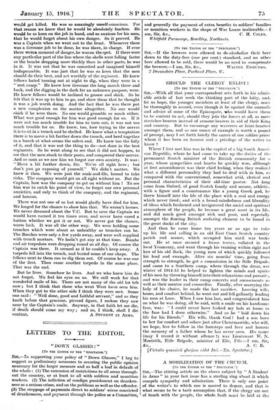SHOULD THE CLERGY ENLIST?
[To THE EDITOR OF THE " SFEcriTog."1 SIR,—With all that your correspondent sets forth in his admir- able article of last week the thinking part of the laity, and. let us hope, the younger members at least of the clergy, must be thoroughly in accord, even though it be against the counsels and advice of some of the Episcopate, who would have them to be content to act, should they join the forces at all, as mere stretcher-bearers instead of armour-bearers in aid of their King and country. But to encourage any waverers or faint-hearted amongst them, and as one ounce of example is worth a pound of precept, may I set forth briefly the career of one soldier-priest whom it has been an honour and a privilege of the writer to know ?
Where I first met him was in the capital of a big South Ameri- can Republic, where he had come to take up the duties of tin. permanent Scotch minister of the British community for a year, whose sympathies and hearts he quickly won, although at first astonishment was their chief feeling, when they realized what a different personality they had to deal with in him, as compared with the conventional, somewhat arid, clerical and personal characteristics of their old-time pastor. Not long come from Oxford, of good Scotch family and means, athletic., with a figure and a countenance like a young Greek god, he threw himself into the life of the place with a zeal and energy which never tired ; and with a broad-mindedness and liberality of ideas which freshened and invigorated the social and spiritual atmosphere of the people, he became a great asset in its life, and did much good amongst rich and poor, and especially amongst the floating British seafaring element to be found in the great docks of the city.
And then he came home ten years or so ago to take up his life and calling in an old East Coast Scotch country parish and manse, which occupied him until war broke out. He at once secured a locum tenens, enlisted in the local Yeomanry, and went through his training within sight and ken of his old flock, the young men of which quickly followed his lead and example. After six months' time, going from strength to strength, he got a commission in the Rifle Brigade. and came to a Southern camp, where through the drear, wet winter of 1914-15 he helped to lighten the minds and spirits of his men by throwing himself into their relaxations and pursuitr, and was the leader in their camp concerts and amusements as well as their mentor and counsellor. Finally, after marrying the lady of his choice, he made the /ast sacrifice. Leaving wife, home, and comfort behind, he went out and fell gallantly leading his men at Loos. When I saw him last, and congratulated hint on what he was doing, all he said, with a smile on his handsome face, was : "I could never have looked my lads at home in the face had I done otherwise." And so he "laid down his life for his friends." His wife, thank God ! had a son born to her for comfort and solace just after Christmastide, who will. we hope, live to follow in the footsteps and love and honour the memory of a father whom he has never seen. His name (may I record it without offence ?) was Lieutenant IV. N. Monteith, Rifle Brigade, minister of Elie, Fife.—I am, Sir,


































 Previous page
Previous page